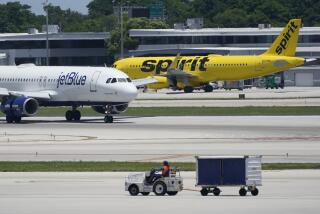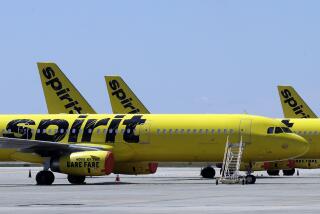The pros and cons of latest airline mergers
Delta and Northwest are getting serious about each other. US Airways and United want to date -- again.
Less than eight years after the last round of carrier courtships, merger mania is back. As customers, should we applaud the march to the altar or cringe? It’s hard to know. Like marriages, all mergers are different.
One thing you can count on, several experts say: The first few months or even years can be rocky. Call it corporate indigestion. Symptoms include service glitches and disorganization.
What experts don’t agree on is whether it’s worth it in the end.
“Mergers will be disruptive in the short term and beneficial in the long term,” said Richard Crum, president of the Assn. of Corporate Travel Executives, a network of 2,700 business travel buyers and suppliers based in Alexandria, Va.
He sees mergers expanding networks, giving frequent fliers more choices and forging “strong global competitors,” never more important than now, as oil prices spiral upward.
But Kevin Mitchell, president of the Business Travel Coalition, an advocacy group for buyers of business travel based in Radnor, Pa., sees “shuttered hubs, wrecked communities, disappointed employees, poor service and, of course, higher prices.”
Some possible outcomes, plus tips:
Worse service: “Mergers result in disgruntled employees who, for better or worse, take it out on passengers,” said Ron Kuhlmann, editor of Scorecard, a monthly aviation newsletter based near San Francisco.
Among the issues: layoffs, conflicting union contracts and operational differences. Service can fall to the lowest common denominator, as suggested by the last big merger of U.S. carriers.
In 2004, the year before they combined, America West ranked No. 6 and US Airways was No. 12 in the annual Airline Quality Rating by Wichita State University in Kansas and University of Nebraska researchers. The next year, the merged US Airways ranked No. 15 in the study, which ranks airlines based on flight delays, mishandled bags, denied boardings and customer complaints.
By 2007, US Airways had risen to No. 11 in the rankings. And in the first quarter this year, it had the second-best on-time record among carriers ranked by the government.
The tip: Be patient. Things may get better.
Fewer flights: Merged airlines typically get rid of overlapping routes and hubs, which may reduce service.
In 2005, America West and US Airways together operated more than 1.13 million flights, according to OAGback Aviation Solutions, a data and consulting company in New Haven, Conn. In 2006, the total fell by 6%, which was several times the industrywide drop.
The tip: Watch for changes in flight schedules.
Higher fares: Given record-high fuel costs, “we’re going to see ticket prices go up, whether there are mergers or not,” said Tim Winship, an editor for SmarterTravel.com. “But the mergers are going to exacerbate the situation.”
His logic: Less competition leads to higher prices. It’s a view that many -- but not all -- experts share.
“We already have a hypercompetitive environment,” said Crum of the Assn. of Corporate Travel Executives. “And a couple of mergers is not going to change that.”
Fliers might even get a break in fares if the economy declines further.
The tip: Bet with the experts and book flights now, before fares increase.
Big is good: “The larger the company, the more likely it is to soldier on indefinitely through bankruptcies and tough times,” Winship said. Big companies have deeper pockets. And as we’ve seen before, the government has bailed out big airlines when they’ve found themselves in big trouble. So one plus one can equal a whole lot.
In a year that has already seen the demise of several small carriers, this is a comforting thought.
The tip: Count your potential blessings.
Frequent fliers, fear not: Every expert I spoke with said that mileage programs were so valuable that there’s little chance the airlines would dump them in a merger. More likely, you’ll be able to pool your miles to get an award ticket faster to more places.
The tip: Keep your miles.
jane.engle@latimes.com
More to Read
Sign up for The Wild
We’ll help you find the best places to hike, bike and run, as well as the perfect silent spots for meditation and yoga.
You may occasionally receive promotional content from the Los Angeles Times.






